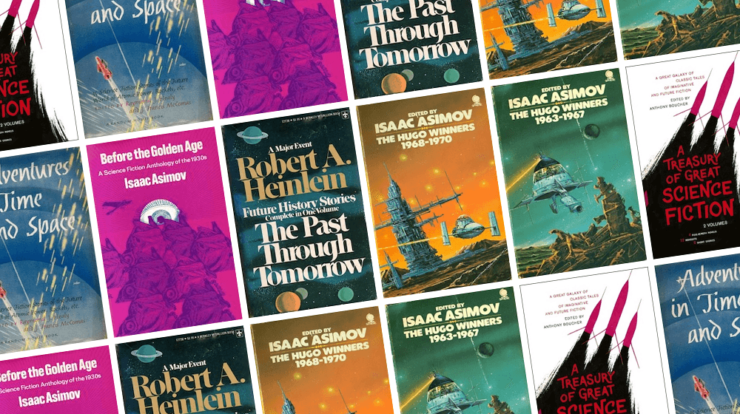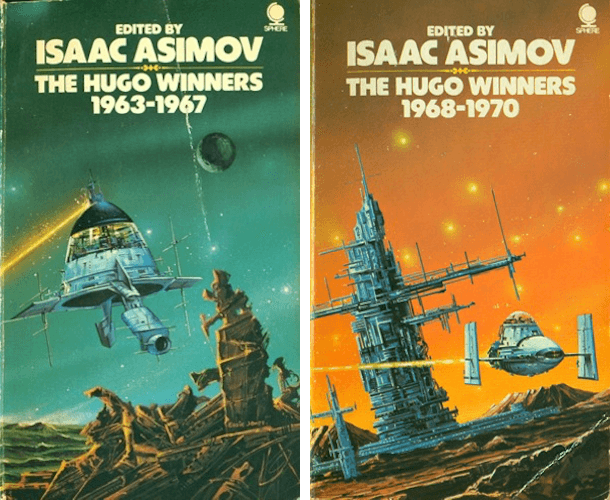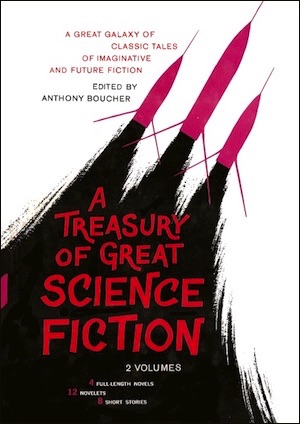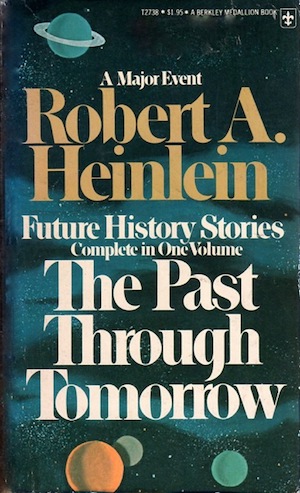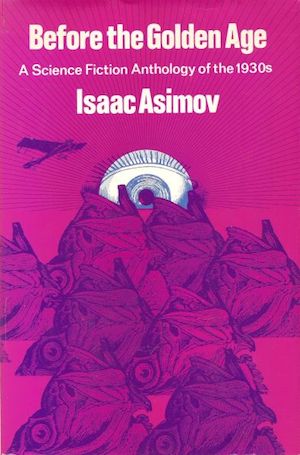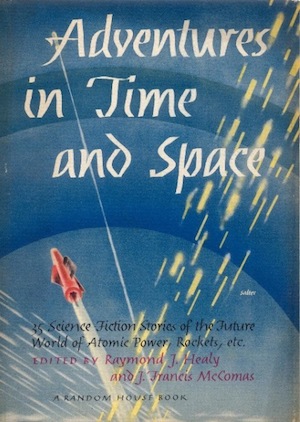One benefit of being a reader of a certain vintage—old enough to remember inkwells in school desks, say, if not old enough to have used a dip pen —is the giddy joy of encountering insert ads in mass market paperbacks. It wasn’t just that they weakened the spines of the books or that some of them were youth-inappropriate cigarette ads. A fair fraction of them were variations on this ad.
Founded in the early 1950s, the mail order Science Fiction Book Club was a godsend for isolated readers like myself . Not only did they automatically send out books until actively stopped (a wonderful way for chronic procrastinators to encounter new authors), but they offered wonderful collections, anthologies, and omnibuses of unusual size. These were tomes heavy enough to stun a moose. For SF addicts, these books were like being able to order our drug of choice by the 100kg sack.
Here are my five plus one* favourites from the Before Times:
The Hugo Winners, Volumes 1 & 2, edited by Isaac Asimov. This collection was always featured prominently in the insert ads, so it is no surprise that this was the very first volume I bought. Strictly speaking, it should have been called some of the Hugo Winners, as it restricts itself to novellas, novelettes, and short stories. You won’t find The Demolished Man or The Big Time in here, but you will encounter a delightful assortment of shorter pieces published between 1955 and 1968. The book includes classics like Simak’s “The Big Front Yard,” Bloch’s “That Hell-Bound Train,” and the original version of Daniel Keyes’ Flowers For Algernon.
Science fiction is always evolving, but the contrast between the first volume (which collects stories from 1955 to 1960) and the second (which collects material from 1962 to 1968) is a striking record of the sea change that came over SF in the era of the New Wave. Of course, nobody embraces change quite like the denizens of science fiction fandom; I can only imagine the gleeful cries of joy as stories like Clarke’s “The Star” were followed by more experimental efforts along the lines of Farmer’s “Riders of the Purple Wage.”
A Treasury of Great Science Fiction, edited by Anthony Boucher, has a rather bold title, given that American commercial science fiction was barely out of nappies when this two-volume treasury was first published in 1959. Whereas Asimov had celebrated the collective taste of fans, A Treasury put Boucher’s editorial tastes and considerable experience on display. Some might expect, given that many modern Best Of lists mention the same handful of works over and over, that there would be a considerable overlap between The Hugo Winners and A Treasury. Not so. None of the twenty-five works in Boucher’s two-volume anthology showed up in the Asimov collection. Boucher offered tales from engineer-bait like George O. Smith’s “Lost Art” to a complete novel, the vengeance-fest The Stars My Destination by Alfred Bester.
I was most fond of the SFBC’s anthologies, but I also took a shine to The Past Through Tomorrow by Robert A. Heinlein, which I’ve worn out twice: once in the SFBC hardcover and once in a Berkley Mass Market Paperback. It collects Heinlein’s future history stories as of 1967, omitting only Orphans of the Sky—but that does not dim my pleasure in the twenty-one stories and two full novels it *does* include.
Before the Golden Age was also edited by Isaac Asimov, who helmed The Hugo Winners series. This collection has a different focus. Asimov assembled older works from the infancy of American science fiction, none of them apt to win any awards. A lot of the stories are dreadful quite primitive, stressing action over characterization and prose style. The collection is still fun, however, if only as a fascinating tour of early U.S. science fiction.
(*) Adventures in Time and Space, edited by Raymond J. Healy and J. Francis McComas, gets an asterisk because it’s the one I couldn’t have purchased from the SFBC when I was a callow youth. The SFBC edition of this 1949 classic came out in 1990, by which time I had long owned a copy. One has to envy the teens of 1990 who got to encounter it for the first time. Adventures offered almost three dozen pieces, all from the 1930s and 1940s. Like Before The Golden Age, this volume is more interesting as history than literature.
The five (plus one) books listed above have one thing in common: women authors are rare or absent. OK, it’s understandable that the Heinlein collection didn’t include any women, but as to the other books… there were women writing SF in the olden times. These anthologists (all male, one might note) declined to collect their works. Stay tuned for anthologies that addressed this oversight.
Of course, it goes without saying these books were and are my favourites. Those of you who were also SFBC customers in the days of yore might have your own favourites (perhaps A Science Fiction Argosy by Damon Knight, or the various Science Fiction Hall of Fame collections). Feel free to discuss their merits in comments!
In the words of Wikipedia editor TexasAndroid, prolific book reviewer and perennial Darwin Award nominee James Davis Nicoll is of “questionable notability.” His work has appeared in Publishers Weekly and Romantic Times as well as on his own websites, James Nicoll Reviews and Young People Read Old SFF (where he is assisted by editor Karen Lofstrom and web person Adrienne L. Travis). He is surprisingly flammable.










